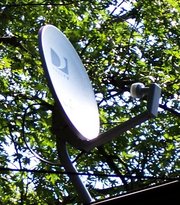Philips
Koninklijke Philips Electronics N.V. (Royal Philips Electronics N.V.), usually known as Philips, (Euronext: PHIA, NYSE: PHG) is one of the largest electronics companies in the world. In 2004, its sales were € 30. more...
3 billion and it employed 159,709 people in more than 60 countries. Philips is organized in a number of divisions: Philips Consumer Electronics, Philips Semiconductors, Philips Lighting, Philips Medical Systems and Philips Domestic Appliances and Personal Care.
History
The company was founded in 1891 by Gerard Philips in Eindhoven, the Netherlands. Its first products were light bulbs 'and other electrotechnical equipment'. Its first factory remains as a museum. In the 1920s, the company started to manufacture other products, and in 1939 its first electric razor, the Philishave, was introduced. Philips markets its shavers in the USA using the Norelco name. Philips introduced the compact audio cassette tape, which was wildly successful, though its attempt to set a standard for video cassette recorders, the V2000, was unsuccessful in the face of competition from the Betamax and especially VHS standards.
On May 9, 1940, the Philips directors were informed about the German invasion of the Netherlands to take place on May 10. They decided to leave the country and flee to the United States, taking a large amount of the company capital with them. Operating from the US, they managed to run the company throughout the war. At the same time, the company itself was moved to the Netherlands Antilles (on paper) to keep it out of German hands. After the war it was moved back to the Netherlands, with their headquarters in Eindhoven. Many secret research facilities were locked and successfully hidden from the invaders, which allowed the company to get up to speed again quickly after the war.
It is also believed that Philips - both before and during the war - supplied enormous amounts of electric equipment to the German occupation forces, which has led some people to think that the company collaborated with the Nazis, like many other firms in their day. However, there is no evidence to suggest that Philips itself or its management ever sympathized with the Nazis or their ideologies. The only Philips family member who did not leave the country, Frits Philips, saved the lives of 382 Jews by indicating to the Nazis that they were indispensable for the production process at Philips. In 1996, he was awarded the Yad Vashem reward by the Israeli ambassador for his actions. Clearly, there is little Philips could have done to prevent the Germans from abusing their production facilities and forcing their employees to perform slave labor during the occupation. The production facility in Eindhoven was the only Dutch target that was deliberately bombed by the allied forces during the war.
In 1997 the decision was made to move to Amsterdam. The move was completed in 2001. Initially, the company was housed in the Rembrandt tower, but in 2002 they moved again, this time to the Breitner tower. In a sense, the move to Amsterdam can be considered a return to the company's roots, because Gerard Philips lived in Amsterdam when he came up with the idea of building a light bulb factory.
Read more at Wikipedia.org




